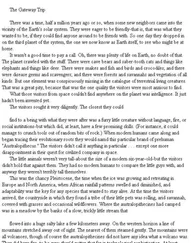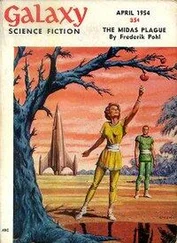Pohl, Frederik - The Age of the Pussyfoot
Здесь есть возможность читать онлайн «Pohl, Frederik - The Age of the Pussyfoot» весь текст электронной книги совершенно бесплатно (целиком полную версию без сокращений). В некоторых случаях можно слушать аудио, скачать через торрент в формате fb2 и присутствует краткое содержание. Жанр: Старинная литература, на английском языке. Описание произведения, (предисловие) а так же отзывы посетителей доступны на портале библиотеки ЛибКат.
- Название:The Age of the Pussyfoot
- Автор:
- Жанр:
- Год:неизвестен
- ISBN:нет данных
- Рейтинг книги:4 / 5. Голосов: 1
-
Избранное:Добавить в избранное
- Отзывы:
-
Ваша оценка:
- 80
- 1
- 2
- 3
- 4
- 5
The Age of the Pussyfoot: краткое содержание, описание и аннотация
Предлагаем к чтению аннотацию, описание, краткое содержание или предисловие (зависит от того, что написал сам автор книги «The Age of the Pussyfoot»). Если вы не нашли необходимую информацию о книге — напишите в комментариях, мы постараемся отыскать её.
The Age of the Pussyfoot — читать онлайн бесплатно полную книгу (весь текст) целиком
Ниже представлен текст книги, разбитый по страницам. Система сохранения места последней прочитанной страницы, позволяет с удобством читать онлайн бесплатно книгу «The Age of the Pussyfoot», без необходимости каждый раз заново искать на чём Вы остановились. Поставьте закладку, и сможете в любой момент перейти на страницу, на которой закончили чтение.
Интервал:
Закладка:
To avoid that, you had to study each prospective mark carefully. No one came down here on business. The best ones were the rubberneck tourists. They usually came in pairs; and, of any two, the one who was being shown around could safely be figured for a greenhorn—himself too fresh out of the freezers, or back from the starways, to be eager for murder as yet. The problem there was to make an accurate assessment of the one who was doing the showing. “That’s whah Ah picked you, Chuck. Ah wasn’t worried about the little boy. Though you can be vurry surprised sometahms.”
And, of course, everything they did was more or less illegal, so you had to watch out for the coppers.
The coppers would not trouble you unless they saw you actually breaking the law—or unless you were wanted for something. Then they would trouble you a lot. Forrester’s first contact with one of the coppers came as he was on the point of bracing a woman alone, Whitlow hiding behind a flowering lilac bush and coaching him in whispers. “See thur, Chuck, what she did? Threw away a cigarette butt. Well, that’s ten to one she’s from nahnteen eighty or earlier, so go get ‘er, boy!” But Forrester had taken no more than a single step before Whitlow’s piercing whisper stopped him. “Copper!”
The copper was seven feet tall, uniformed in blue, swinging what looked like a nightstick but was not Forrester had been warned: it was a sort of joymaker, full of anesthetic sprays and projectile weapons. And the copper had seen him.
It strolled right up to them, swinging the stick. It stopped and looked Whitlow in the eyes, right through the lilac blooms. “Good morning, Man Whitlow,” it said courteously and moved on to Forrester. It stared silently into his eyes. Then, “Nice day, Man Forrester,” it said, and moved away.
“How’d he know?” gasped Forrester.
“Retina pattern. Don’t worry about it; if he wanted you for anything he’d have you by now. Just give him a minute to get out of saht.”
The woman prospect was gone then. But there were plenty of others.
Keeping out of the way of coppers, trying to learn Whitlow’s skill at estimating the potentials of a mark, Forrester found that the time passed. Nor was it the most disagreeable way he had ever spent a day. The weather was warm and dry, the growing plants were scented, the people he hit up were no worse than the average run. Forrester took five dollars from a pretty girl in a sort of mirror-bright bikini, then fifty from a man who had brought his pet animal—it was a little silk-furred monkey—down to the underbuilding park to run free, and who seemed to accept Forrester’s touch as a form of rent for the use of the premises. Forrester paid back Whitlow’s outlay for the fake joymaker and found himself with cash money in his pocket. As he could see no particular need for spending much of it, he began to feel solvent again.
Then Whitlow’s hawk eyes brightened, and he whispered tautly, “Eeow! Look over thur, will you? We’ve got ourselfs a lahv one now!”
On the fringe of a bed of tall gladioli a man had stepped out of a hovercar and dismissed it. He seemed young, although you couldn’t really tell. He moved idly across the grass, like a sightseer. His gait was peculiar, and he wore an expression of grave joy as he minced toward them.
“Look how he walks!” exulted Whitlow.
“I am looking. What about it?”
“Whah, Chuck, he’s out of low-gee! Thur’s a fella just back from a long trip if Ah ever saw one, and prob’ly loaded with pay. Sic ‘im!”
Forrester accepted Whitlow’s diagnosis unquestioningly. He marched up to the spaceman and said clearly, “My name is Charles D. Forrester, and due to my ignorance of the customs of this time I’ve lost all my money and have no work. If you could possibly spare me some cash, I would be deeply indebted to you.”
Whitlow appeared magically at his elbow. “That goes for me, too, boss,” he said sorrowfully. “We both in pretty bad trouble. If you could be kahnd enough to help us now, we’d be eternally grateful.”
The man stopped, his hands in his pockets, neither surprised nor disturbed. He turned to face them with grave interest. “Sorry to hear that, gentlemen,” he said. “What seems to be your problem, sir?”
“Mahn? Well, it’s just about lahk Forrester here. Mah name’s Whitlow, Jurry Whitlow. It starts way back when Ah was first born, working in the mahns in West Virginia. They closed down, and—”
The spaceman was not only polite but patient. He listened attentively through all of Whitlow’s long story, and to as much of Forrester’s as Forrester thought worth telling. He commiserated with them, wrote their names down, and promised to look for them again if he ever came back this way. He was, in short, an ideal prospect—not only a spaceman, but a member of one of the rotating crews who manned the right-angle communications satellites that whirled out around the sun at ninety degrees to the ecliptic, furnishing interference-free relay facilities for the whole solar system. The job paid well, but that was only part of it. Because of the energy budget for matching orbits with the right-angle satellites, the crews were relieved only at six-month intervals, and they came back with a fortune in their pockets and a mad hunger for company; and Whitlow and Forrester walked away from him with two thousand dollars apiece.
That night they ate their dinner in a restaurant. Over Whitlow’s protests, Forrester insisted on standing treat.
The restaurant was a hangout for Forgotten Men—and Forgotten Women. It was something like a private home, something like an Automat. You had full joymaker service in it, but in order to make it work you had to feed money into a slot. The prices caused Forrester’s scalp to prickle, but he reassured himself that he was just learning the ropes and experience was worth paying for; so at Whitlow’s suggestion they started with a squirt of joy apiece (fifty dollars a shot), then cocktails (forty), then a clear, filling soup (twenty-five), then more drinks, and about then Forrester began to lose count. He remembered something that looked like meat but wasn’t—it seemed to be coated with a sort of vanilla fudge, although it was bloody inside—and then they began drinking in earnest.
They were not alone. The place was crowded. Whitlow seemed to know everyone there, an assembly that hailed from six centuries, seven continents, and one or two extraterrestrial planets and moons.
There was a huge red-faced man named Kevin O’Rourke na Solis Lacis, who gave Forrester a shock until they exchanged names, for he resembled Heinzie the Assassin. The reason was good, when Forrester found it out: they were both Martians. O’Rourke, however, was a poet. As a matter of principle, he refused to accept the bribes of what he called the iron-headed state. Probing, Forrester discovered that he was talking about foundation grants, which were available to poets in almost any quantity; but O’Rourke spurned them all. He had been briefly involved with the Ned Lud Society—but they were as bad as the iron-heads, he declared. All Earth was a disaster area. Let the Sirians take it away! “So why don’t you go back to Mars?” Forrester inquired, politely enough; but the Martian took it as an insult, glowered, and lumbered away across the room.
“Don’ worry ‘bout heem,” said the pretty little dark girl who had somehow come to be leaning against Forrester’s shoulder, helping him drink his drink. “He be back. Certainement.”
There was a certain United Nations quality to the gathering, Forrester was discovering. Apart from a few oddballs like the Martian poet, the bulk of the Forgotten Men seemed to come from nearly his own time. Had the hardest time fitting in, he supposed—and the hardest time earning money.
Читать дальшеИнтервал:
Закладка:
Похожие книги на «The Age of the Pussyfoot»
Представляем Вашему вниманию похожие книги на «The Age of the Pussyfoot» списком для выбора. Мы отобрали схожую по названию и смыслу литературу в надежде предоставить читателям больше вариантов отыскать новые, интересные, ещё непрочитанные произведения.
Обсуждение, отзывы о книге «The Age of the Pussyfoot» и просто собственные мнения читателей. Оставьте ваши комментарии, напишите, что Вы думаете о произведении, его смысле или главных героях. Укажите что конкретно понравилось, а что нет, и почему Вы так считаете.












